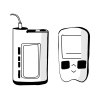Device Combo

What system do you use and why?
My device combo is a smart system with a continuous glucose monitor and a pump. So what that means, specifically, is it is creating a feedback system between my continuous glucose monitor and my older Medtronic 522 pump, which also relies on a radio signal from a 'RileyLink' that allows all of these things to connect, and display on my phone. This allows me to have automated insulin delivery, which is the main reason that I use this system.
It's worth it to me, particularly when I sleep and wake up to see that the closed loop has gotten my blood sugar down, or suspended my insulin.
I can tweak things on my own, so it's the right trade-off between a lot of extra work, and a lot more security and feelings of safety, particularly at night or when I'm stressed out and I just don't have time to really devote to making diabetes the number one job in my life.
What challenges have you had with your devices and how have you overcome them?
When you have devices, there's a lot of different mechanical parts that can go wrong, so there's this lack of security. It doesn't matter what system I use, it's always a concern.
It took me a few months to implement the system I use because I'm not a super tech person, even though I'm very interested in technology. Learning a methodical way to troubleshoot has built some skills for me to rely on the system more. That kind of goes across the board - knowing who you could reach out to and also having a troubleshooting methodology. Still, there's some insecurity at the end of the day when a system doesn't work, but that's the way I've overcome most of the anxiety around it.
Diabetes devices can produce a lot of information and numbers. How do you feel about this?
Not always understanding what to do with information from devices is a really big issue. Diabetes devices, for me, produce a lot of numbers, and what you do with them, and how I feel about that is something that I look at from multiple angles. I really am interested in data professionally, and visualizing it, but when it comes to the devices I use, things that tell me what I need to know at the right time are best. For example, the Dexcom recap sends you an email on Sundays that tells you some major insights about your week. I kind of know it's coming, and it summarizes what I need to know, so it's manageable. Otherwise it's not information, it's just numbers.

This is my Medtronic Pump.
What helps you trust your devices?
Insulin injections are more simple and reliable, ironically, because they can do less in terms of these little tweaks and nuances.
I've overcome the worry of reliability with what I used to use and what I use now by learning more. I learn from the communities of people that use these systems because they're people you can reach out to when something's not working.
How do you make the devices comfortable on your body?
Comfort with diabetes devices is something that has become increasingly important and interesting to me, and I've learned a lot from tapping into other people who have diabetes.
I used to only use my stomach for my continuous glucose monitor. Now, I use my forearms, and I like the profile when I wear clothes because I don't have this weird bulky thing on my stomach, and it's more out of the way.
Sometimes it's something that's not explicitly recommended, either. Like, there's this weird zone of 'it's not exactly what you'd see in the manual for your device in terms of insertion place for your age group,' but it's something that really works. And if it works well enough, it's worth doing.
More Wisdom

Even though my pump has malfunctioned before it is worth having because my blood sugar is more in control when I use it.
Ashley


Diabetes is one piece of my life that I now have some control over.
Kelsey


I get tired of the CGM beeping at me at times especially if my blood sugar is low and I’m waiting for it to climb, but I’m thankful it wakes me up at night!
Joyce




